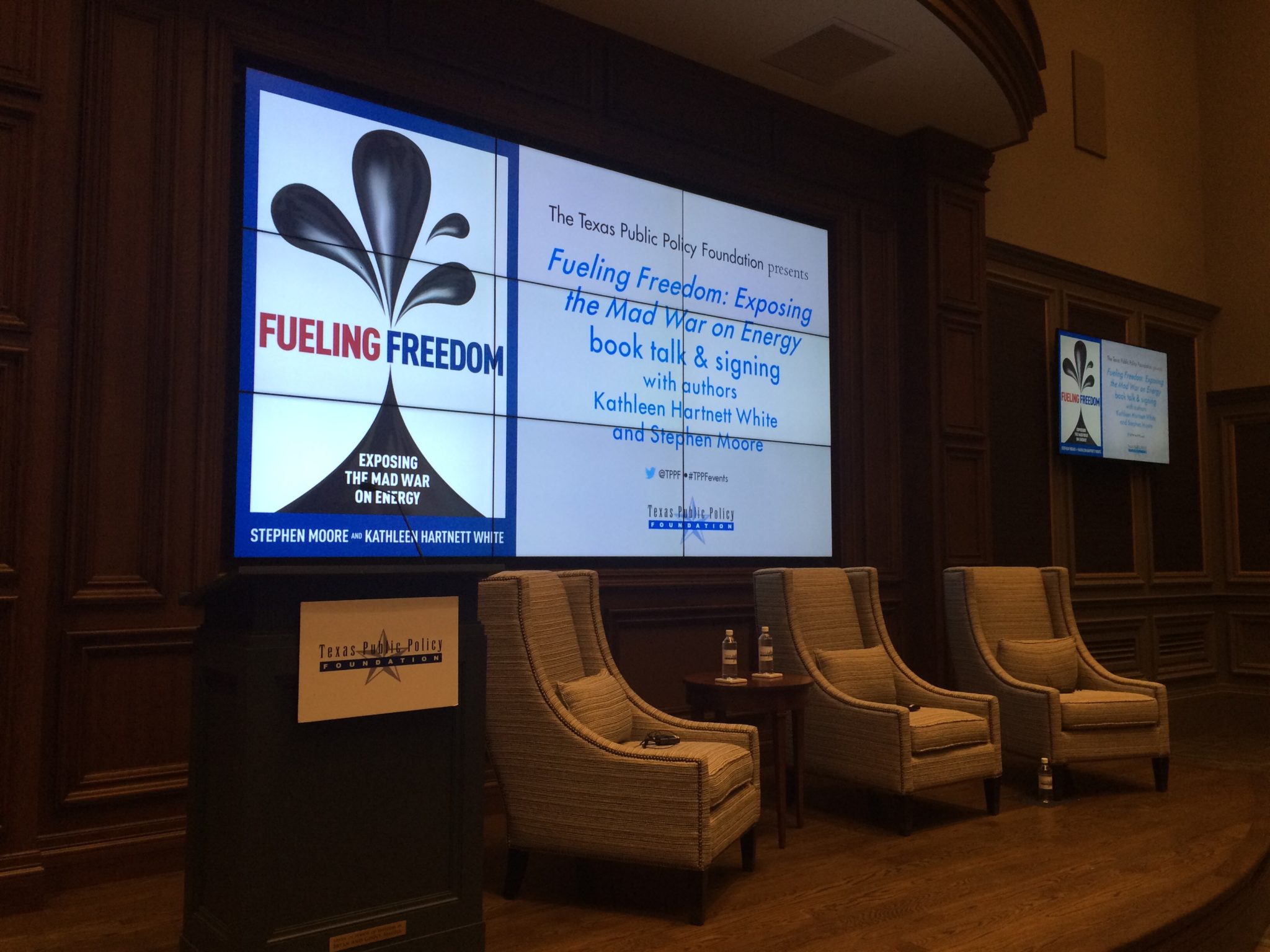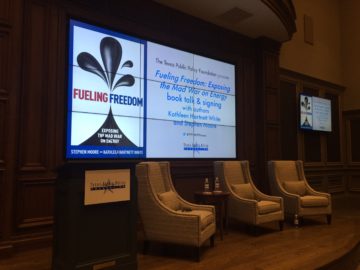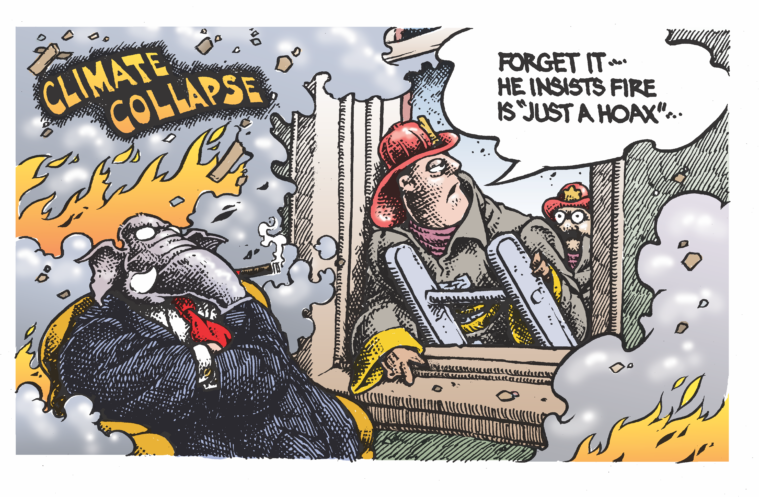
Former TCEQ Chairman: Renewables Are ‘False Hope’
A Texas think tanker’s latest book espouses the virtues of fossil fuels and argues that countries should resist shifting to renewables.

As Kathleen Hartnett White praised the “expanding benefits” of fossil fuels and the “breathtaking” development of fracking during her Wednesday talk at the Texas Public Policy Foundation (TPFF), protestors outside did their best to counteract her message. They held up signs with photos of children who have sued states for failing to take adequate action to reduce carbon emissions, and they chanted: “No more coal, no more oil, keep the carbon in the soil!”
White, who directs TPFF’s Armstrong Center for Energy and Environment, told the audience gathered in a plush new auditorium, that climate science is “highly uncertain” and that “renewables are a false hope.”
She swung from reiterating climate denier talking points — such as questioning whether NOAA data is reliable — to arguing that fossil fuels should not be abandoned because they’re the only means of ensuring economic prosperity. White didn’t repeat one of her stranger assertions: “Fossil fuels dissolved the economic justification for slavery.”
In addition to working at TPPF, a corporate-funded think tank in Austin, White co-authored Fueling Freedom: Exposing the Mad War on Energy. She and her co-author Stephen Moore, of the Heritage Foundation, a right-wing policy group in Washington, D.C., have been on a tour of the state, promoting their book.
In a wide-ranging speech, White told the audience that economic prosperity has been historically linked with the use of fossil fuels. Climate policies to ratchet down carbon emissions are threatening to rapidly eliminate fossil fuels and thereby limit economic growth. Renewables are not a viable option, she said, because they “cannot provide [energy] at the scale that is needed to continually drive economic growth.”
Her argument suggests that countries can only take an all-or-nothing approach — relying on fossil fuels or renewables but not both. She does not acknowledge that current use of solar and wind energy in conjunction with oil and gas provides environmental and economic benefits. In Texas, wind power now provides 10 percent of the electricity for the state and on some windy winter days as much as 45 percent.
White took aim at the Paris Agreement, the international climate accord that the United States signed in April. White called the agreement “futile” because the pledges to reduce carbon emissions are insufficient to thwart climate change. (Climate scientists and world leaders see the pledges as a starting point to build on.)
UN leaders “now speak openly that communism is the best model for taking the measures that are needed to avert global warming,” she told the audience. (She seemed to be referring to comments by the UN climate chief that China has been able to implement tough climate policies because of its political system.)
White’s talk prompted the Texas Drought Project, an environmental group, to organize the rally outside the foundation’s office. “The denier community provides cover for people who might come our way if they weren’t around,” said Jere Locke, co-founder of the group. “The deniers influence those on the fence.”
White’s and Moore’s views are inconsistent not only with the scientific mainstream but also with the opinions of most Americans. A March Gallup poll found that about two-thirds of Americans are worried about climate change. In Texas, those numbers run higher. According to a 2013 Yale study, 70 percent of Texans believe climate change is a problem and more than half believe action by state and federal political leaders is needed to address it.
White is a member of the CO2 Coalition, a nonprofit founded in 2015 that reminds readers on its website that “CO2 is a nutrient that is essential to life.” A Greenpeace sting operation found that the group was willing to author oil and gas-friendly reports in exchange for money. White was appointed by Governor Rick Perry to serve on the Texas Commission on Environmental Quality from 2001 to 2007. During her time on the commission, she reversed an opinion by administrative judges and voted to grant a permit to a Central Texas coal plant, a move that led environmental groups to call for her replacement.
Both TPPF and the Heritage foundation are part of the State Policy Network, an umbrella group backed by libertarian billionaires Charles and David Koch. TPPF and the Heritage foundation frequently align themselves with fossil-fuel interests. Last year, for instance, TPPF floated a proposal suggesting that states opposed to the Obama administration’s carbon regulations band together and form an interstate compact.
According to the Center for Media and Democracy, TPPF received at least $220,000 from the Koch brothers in 2010. The group has also received funding from ExxonMobil, Chevron and ConocoPhillips.
Locke said money from oil and gas companies is the main motivating factor for deniers to continue questioning climate science. He pointed to the recent findings by news organizations that ExxonMobil’s scientists warned about the risks climate change posed to the planet and the company’s business in the 1980s as evidence that fossil-fuel groups understood climate science.
“They just want to create a tiny amount of doubt … [to] make other people wonder where the truth lies,” he said


